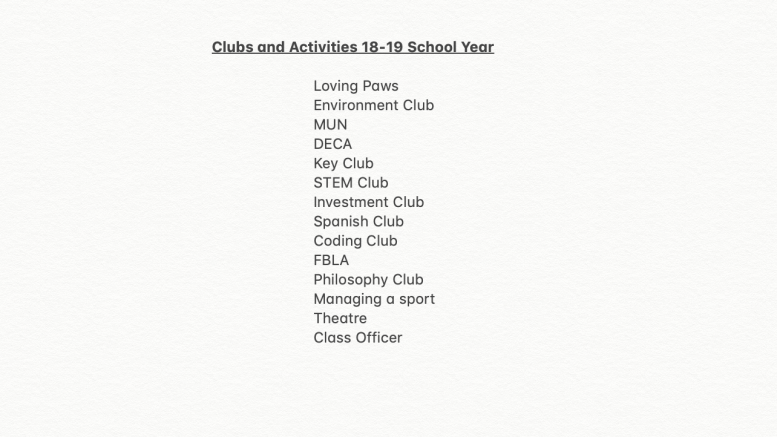With college admissions season slowly approaching, it can be easy to assume that someone who seems to be involved in every club in school is doing the right thing. In my freshmen and sophomore years, I found myself being this person, and it ended up not being worth my time. There are a plethora of reasons why being the do-it-all student can backfire, but here are my top five to help convince you to avoid the mistakes that I made:
1. Nobody has enough time for it.
You will find extremely quickly that being involved in more clubs than you can handle means lots of morning meetings, and this can take away from valuable time you could be using doing more beneficial things such as studying, building relationships with your teachers and making use of their office hours in order to make sure you have understood the concepts taught in class. When classwork begins to speed up this lack of essential morning time can lead to a sense that you are spread too thin.
2. It is harder to do meaningful work.
When you are involved in too many clubs, it becomes harder to do meaningful work because the time you could devote to 3 or 4 clubs you really care about gets divided by the 8 or 9 clubs that you might have, leading to less of your time being available for each activity. You won’t be able to implement an initiative that you really care about in one club if you have to spend time staying involved in too many other ones, so lightening your extracurricular load can help you spend more time on passion-projects.
3. You don’t care about every club.
Even though you may care a little about every single club you are in, if you are anything like me, there are undoubtedly some clubs which feel like they are not your taste. That may be no fault of the club itself, it just comes down to the fact that some clubs cater to people with interests that may differ from yours, or they may focus on a project that you do not connect with. Dropping these fringe clubs can help your overall mental health by allowing yourself to remove stressors and focus on the clubs that you genuinely enjoy being a member of.
4. It is harder to get leadership positions.
This one is simple. If other members do not see you getting involved in club events and attending meetings, it is much less likely that they will vote you in for a leadership position over a recognized face in the club. So while a club may “look good” on paper, you will not end up with the leadership positions you might hope for on your college application if you don’t devote time to clubs you care about.
5. Colleges don’t care.
Colleges want to see that someone has explored their interests enough to the point that you know what you like and do not like, and so a vast array of clubs may not look as good to a college admissions officer as it does to you. Passion and evident leadership-ability will go much further than a high number of club memberships.
Take it from a person who was a do-it-all student for a short period of time: you can do better. Focusing on clubs that ignite your passion and make you feel like your time is well spent will lead to you seeing more benefits than just padding a college application.
